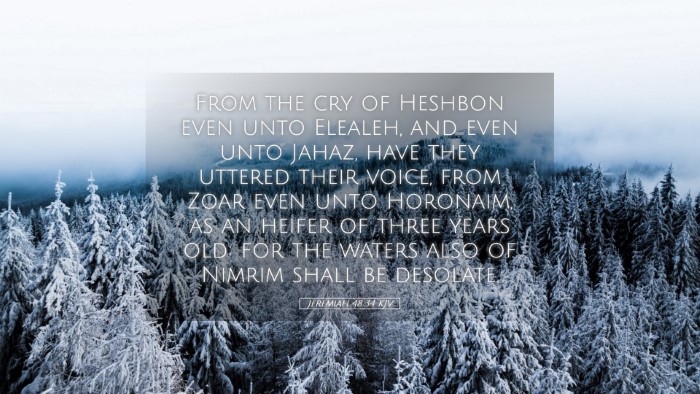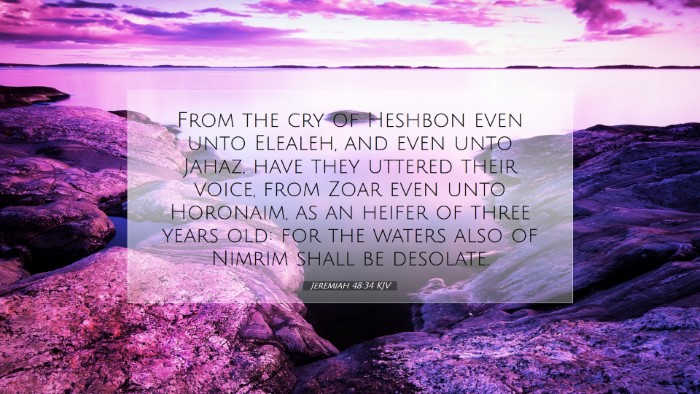Commentary on Jeremiah 48:34
Jeremiah 48:34 states:
"From the cry of Heshbon even unto Elealeh, and even unto Jahaz, have they uttered their voice, from Zoar even unto Horonaim, a holston of three years old; for even the waters of Nimrim shall be desolate."
Introduction
This verse forms part of the prophetic judgment against Moab, a neighboring nation to Israel. To understand the depth of this passage, we draw from various public domain commentaries, including Matthew Henry, Albert Barnes, and Adam Clarke. The verse highlights the lamentation and destruction that shall encompass Moab due to its sins and the resulting divine judgment.
Contextual Background
Moab, often depicted as a symbol of pride and idolatry in scripture, finds itself the subject of God's impending judgment through the prophet Jeremiah. This prophecy underscores not only the historical significance but also the theological implications for Israel and the nations surrounding it.
Geographical Significance
- Heshbon: Once a thriving city, it symbolizes the heart of Moab's wealth and power.
- Elealeh: Known for its high place of worship, Elealeh represents the idolatrous practices that led to Moab's downfall.
- Jahaz: A significant battlefield in Israel's history, indicating the spiritual conflict present.
- Zoar and Horonaim: These cities further emphasize the breadth of Moab's valleys and the extent of its anguish.
Commentary Insights
Matthew Henry's Perspective
Matthew Henry elaborates on the aspect of doom pronounced over Moab, emphasizing the connection between their outcries and the gravity of their transgressions. He notes:
"The cries of these cities indicate a pervasive sense of despair and hopelessness, akin to the cries heard in times of great calamity."
Albert Barnes' Analysis
Albert Barnes provides a careful examination of the phrase "holston of three years old," suggesting that this represents the sustenance and refreshment that will be removed from the land:
"The reference to waters turning desolate serves as a metaphor for devastation—life sources extinguished due to divine judgment."
He also emphasizes that the geographic markers in this verse highlight the extensive reach of God's judgment, illustrating that all corners of Moab will be affected.
Adam Clarke's Interpretation
In Adam Clarke's commentary, he emphasizes the prophetic nature and imminent distress that shall befall Moab:
"The mention of specific locations signifies the thoroughness of destruction—no place will be exempt from grief and loss."
Clarke also warns theologians and scholars to recognize the gravity of sin against God, as it invariably leads to desolation.
Theological Implications
This verse calls pastors and scholars to consider several profound truths regarding God's judgment:
- The Nature of Sin: Moab's downfall serves as a warning of the consequences of pride and idolatry.
- Divine Justice: God's judgments are thorough and absolute; the outcry of cities in Moab reflects the seriousness of their rebellion.
- Hope for Redemption: Despite the bleak message of judgment, there remains a core theme in scripture of hope and restoration for those who repent.
Lessons for Today
In drawing lessons from Jeremiah 48:34, we encourage the following reflections:
- Examine Our Idolatry: Just as Moab’s sin led to their ruin, modern believers must examine areas in their lives that may stand contrary to God's will.
- Cry Out to God: Recognizing our need for divine assistance in times of trouble, just as Moab’s cities cried out.
- Proclaim God's Righteousness: As ministers of the gospel, sharing the full truth of scripture—both judgment and grace—is essential for a complete understanding of God’s character.
Conclusion
Jeremiah 48:34 serves as a poignant reminder of the consequences of sin while also encouraging believers to seek restoration through repentance. The insights from Henry, Barnes, and Clarke provide enriching layers to understanding this scripture’s depth. May this reflection prompt a deeper engagement with God’s word and a sincere life aimed toward holiness.


